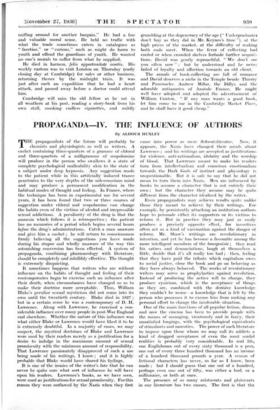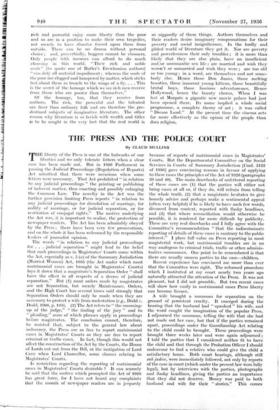PROPAGANDA IV. THE INFLUENCE OF AUTHORS
By ALDOUS HUXLEY
THE propagandists of the future will probably be chemists and physiologists as well as writers. A cachet containing three-quarters of a gramme of chloral and three-quarters of a milligramme of scopolamine will produce in the person who swallows it a state of complete-psychological malleability akin to the state of a subject under deep hypnosis. Any suggestion made to the patient while in this artificially induced trance penetrates to the very depths of the sub-conscious mind and may produce a permanent modification in the habitual modes of thought and feeling. In France, where the technique has been in experimental use for several years, it has been found that two or three courses of suggestion under chloral and scopolamine can change the habits even of .the victims of alcohol and irrepressible sexual addictions. A peculiarity of the drug is that the amnesia which follows it is retrospective ; the patient has no memories of a period which begins several hours before the drug's administrations. Catch a man unaware and give him a cachet ; he will return to consciousness firmly believing all the suggestions you have made during his stupor and wholly unaware of the way this astonishing conversion has been effected. A system of propaganda, combining pharmacology with literature, should be completely and infallibly effective. The thought is extremely disquieting.
It sometimes happens that writers who are without influence on the habits of thought and feeling of their contemporaries begin to exercise such an influence after their death, when circumstances have changed so as to make their doctrine more acceptable. Thus, William Blake's peculiar sexual mysticism did not come into its own until the twentieth century. Blake died in 1827 ; but in a certain sense he was a contemporary of D. H. Lawrence. Along with Latvrence, he exercised a con- siderable influence over many people in post-War England and elsewhere. Whether the nature of this influence was what either Blake or Lawrence would have liked it to be is extremely doubtful. In a majority of cases, we may suspect, the mystical doctrines of Blake and Lawrence were used by their readers merely as a justification for a desire to indulge in the maximum amount of sexual promiscuity with the minimum amount of responsibility. That Lawrence passionately disapproved of such a use being made of his writings, I know.; and it is highly probable .that Blake would have shared his feelings.
It is one of the ironies of the writer's fate that he can never be quite sure .what sort of influence he will have upon his readers. Lawrence's books, as we have seen, were used as justifications for sexual promiscuity. For this reason they were outlawed by the Nazis when they first came into power as mere Schmutzliteratur. Now, it appears, the Nazis have changed their minds about Lawrence ; and his writings arc accepted as justifications for violence, anti-rationalism, idolatry and the worship of blood. That Lawrence meant to make his readers turn from intellectualism and conscious emotionalism towards the Dark Gods of instinct and physiology is unquestionable. But it is safe to say that he did not mean to turn them into Nazis. Men are influenced by books to assume a character that is not entirely their own ; but the character they assume may be quite different from the character idealised by the writer.
Even propagandists may achieve results quite unlike those they meant to achieve by their writings. For example, by persistently attacking an institution authors hope to persuade either its supporters or its victims to reform it. But in practice they may just as easily produce a precisely opposite effect, for invectives often act as a kind of vaccination against the danger of reform. Mr. Shaw's writings are revolutionary in intention, and yet he has become a favourite among the more intelligent members of the bourgeoisie ; they read his satires and denunciations, laugh at themselves a little, decide that it's all really too bad ; then, feeling that they have paid the tribute which capitalism owes to social justice, close the book and go on behaving as they have always behaved. The works of revolutionary writers may serve as prophylactics against revolution. Instead of producing the active will to change, they produce cynicism, which is the acceptance of things as they are, combined with the derisive knowledge they couldn't be worse—a knowledge that is felt by the person who possesses it to excuse him from making any personal effort to change the intolerable situation.
One of the main functions of all popular fiction, drama and now the cinema has been to provide people with the means of assuaging, vicariously and in fancy, their unsatisfied longings, with the psychological equivalents of stimulants and narcotics. The power of such literature to impose upon those whom we may call its addicts a kind of drugged acceptance of even the most sordid realities is probably very considerable. In real life, one Englishman out of every sixty thousand is a peer, one out of every three hundred thousand has an income of a hundred thousand pounds a year. A census of fictional characters has never„ so far as I know, been made ; but I should guess that one out of a hundred, perhaps even one out of fifty, was either a lord, or a millionaire, or both at once.
The presence- of so many aristocrats and plutocrats in our literature has two causes. The first is that the rich and powerful enjoy more liberty than the poor and so are in a position to make their own tragedies, not merely to have disaster forced upon them from outside. There can be no drama without personal choice ; and, proverbially, beggars cannot be choosers. Only people with incomes can afford to do much choosing in this world. "Their rich and noble souls" (to quote one of Butler's Erew•honian authors) " can defy all material impediment ; whereas the souls of the poor arc clogged and hampered by matter, which sticks fast about them as treacle to the wings of a fly. . . . This is the secret of the homage which we sec rich men receive from those who are poorer than themselves."
Of the homage, too, that they receive from authors. The rich, the powerful and the talented are freer than ordinary folk and are therefore the pre- destined subjects of imaginative literature. The other reason why literature is so lavish with wealth and titles is to be sought in the very fact that the real world is so niggardly of these things. Authors themselves and their readers desire imaginary compensations for their poverty and social insignificance. In the lordly and gilded world of literature they get it. Nor are poverty and powerlessness their only troubles ; it is more than likely that they are also plain, have an insufficient and/or unromantic sex life ; are married and wish they weren't or unmarried and wish they were ; are too old or too young ; in a word, are themselves and not some- body else. Hence those Don Juans, those melting beauties, those innocent young kittens, those beautifully brutal boys, those luscious adventuresses. Hence Hollywood, hence the beauty chorus. When I was last at Margate a gigantic new movie palace had just been opened there. Its name implied a whole social programme, a complete theory of art ; it was called " Dream Land." At the present time the cinema acts far more effectively as the opium of the people than does religion.















































 Previous page
Previous page